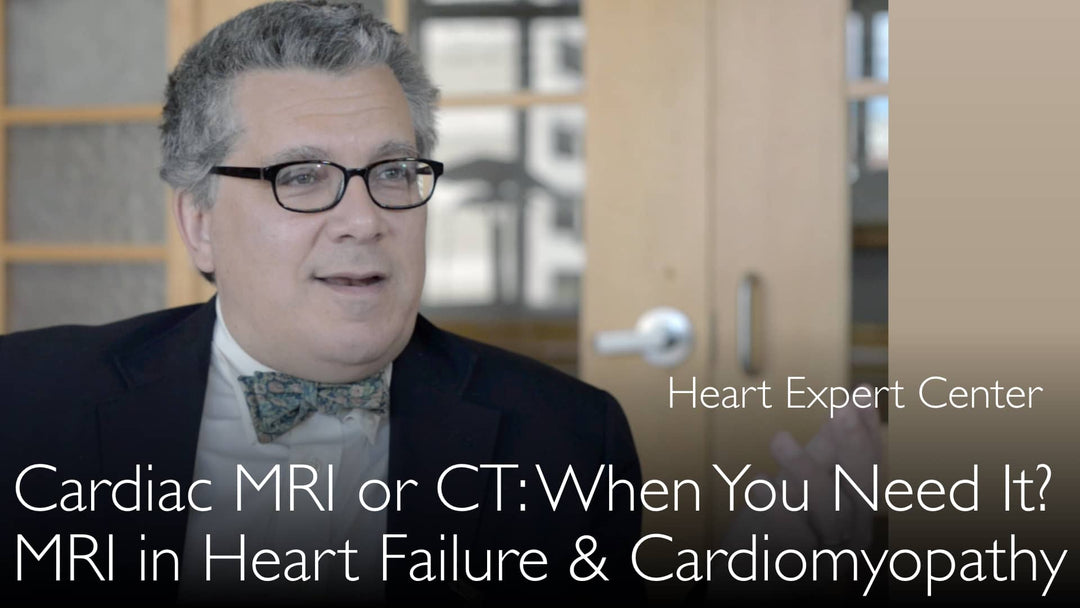Leading expert in radiology, CT, and MRI, Dr. Kent Yucel, MD, explains how cardiac MRI provides a detailed diagnosis for heart failure and cardiomyopathy. He discusses when advanced cardiovascular imaging is indicated beyond initial tests like echocardiography. Dr. Kent Yucel, MD, highlights that MRI is superior for identifying the specific cause of heart muscle disease. A medical second opinion can confirm MRI results and help choose the best treatment strategy.
Advanced Cardiac MRI for Heart Failure and Cardiomyopathy Diagnosis
Jump To Section
- When to Consider Cardiac MRI
- MRI vs Echocardiography in Heart Failure
- Benefits of Cardiac MRI Scan
- Role of Medical Second Opinion
- Cardiac CT and MRI Applications
- Full Transcript
When to Consider Cardiac MRI
Patients and physicians should consider advanced cardiovascular imaging like cardiac MRI when initial evaluations are inconclusive. Dr. Kent Yucel, MD, explains that symptoms like shortness of breath or decreased exercise tolerance often lead to an EKG and echocardiogram first. If these tests identify a problem like heart failure but cannot pinpoint its cause, a cardiac MRI becomes a crucial next diagnostic step.
MRI vs Echocardiography in Heart Failure
Echocardiography is the first-line imaging tool for assessing cardiac function because it is widely available and cost-effective. However, Dr. Kent Yucel, MD, clarifies that cardiac MRI provides a far more detailed evaluation of the heart muscle itself. While echo can show that the heart is failing, MRI is superior for determining the underlying cause of cardiomyopathy, making it an essential tool for a precise diagnosis.
Benefits of Cardiac MRI Scan
A cardiac MRI scan offers unparalleled detail in evaluating heart muscle structure and function. Dr. Kent Yucel, MD, states that MRI is the best modality for finding the cause of a heart muscle abnormality. This detailed information is critical for differentiating between various types of cardiomyopathy and guiding appropriate treatment plans, ultimately leading to better patient outcomes.
Role of Medical Second Opinion
Seeking a medical second opinion is highly valuable for patients with complex heart conditions. Dr. Anton Titov, MD, and Dr. Kent Yucel, MD, both emphasize that a second opinion can confirm and clarify MRI results. This process ensures the diagnosis is accurate and helps patients and their doctors choose the most effective treatment strategy for heart failure or cardiomyopathy with greater confidence.
Cardiac CT and MRI Applications
Cardiac CT and MRI are advanced imaging modalities that serve complementary roles. Dr. Kent Yucel, MD, notes that cardiac CT is best for evaluating coronary arteries, while cardiac MRI excels at assessing heart muscle tissue. The growing availability of these technologies means patients with cardiovascular complaints have more options for obtaining a definitive diagnosis, moving beyond basic testing to advanced, targeted imaging.
Full Transcript
MRI in heart failure and cardiomyopathy allows detailed diagnosis of heart muscle disease. A leading MRI radiologist with special interest in imaging of the heart answers questions for patients in an extensive video interview. When is MRI indicated in heart failure patients? How can patients with cardiomyopathy benefit from cardiac MRI?
Cardiac MRI scan in heart failure or cardiomyopathy patients helps to precisely diagnose the disease. A video interview with a leading expert in radiology, a CT and MRI specialist. Magnetic Resonance Imaging of the heart is used to evaluate heart muscle function.
Dr. Anton Titov, MD: Cardiac CT is best for coronary artery evaluation. MRI scan in heart disease is best to find the cause of heart muscle abnormality.
Dr. Kent Yucel, MD: A medical second opinion can confirm and clarify the meaning of results of MRI in heart failure and cardiomyopathy. It also helps to choose the best treatment strategy for cardiomyopathy and heart failure patients. Seek a medical second opinion on heart disease and be confident that your treatment is the best.
Dr. Anton Titov, MD: What does a heart MRI show?
Dr. Kent Yucel, MD: It shows detailed function of heart muscle. MRI scans are better for suspected heart disease patients with congestive heart failure.
Dr. Anton Titov, MD: Cardiac MRI—what to expect?
Dr. Kent Yucel, MD: Heart disease and MRI testing is a rapidly growing area.
Dr. Anton Titov, MD: Let's start with cardiac applications of CT and MRI. Today, advanced imaging modalities are more widely available to patients. Therefore, consumers look for their choice of potential imaging.
So let's imagine a person who perhaps has a cardiovascular complaint. Maybe this person had shortness of breath or decreased exercise tolerance. He or she has seen a primary care physician and maybe had an EKG (electrocardiogram). When would this person and his or her physician start thinking about more advanced cardiovascular imaging, cardiac CT or cardiac MRI?
Dr. Kent Yucel, MD: Generally speaking, most patients for cardiac function—how the heart works—will go to cardiac echocardiography first. Ultrasound is widely available, easy to do, and relatively inexpensive. Then they might go to cardiac MRI or CT if there are further questions at that point.
Dr. Anton Titov, MD: Is cardiac MRI or cardiac CT something that only a physician can choose? Sometimes a patient who is interested in advanced cardiac imaging—when can they bring to their physician the idea that maybe more advanced cardiovascular imaging could benefit them?
Dr. Kent Yucel, MD: For example, if you have patients developing heart failure, the echocardiography can identify that the heart may be failing or may not be working all that well. But sometimes heart MRI can be more helpful in determining the cause of the heart failure. That is a potential area where the patient and/or the doctor may feel that more imaging might be helpful.
Dr. Anton Titov, MD: So heart failure is a potential indication for cardiac MRI.
Dr. Kent Yucel, MD: Exactly. MRI in heart failure and cardiomyopathy—a video interview with a leading expert in radiology, a CT and MRI specialist.
Dr. Anton Titov, MD: When to do cardiac MRI or cardiac CT scan?




